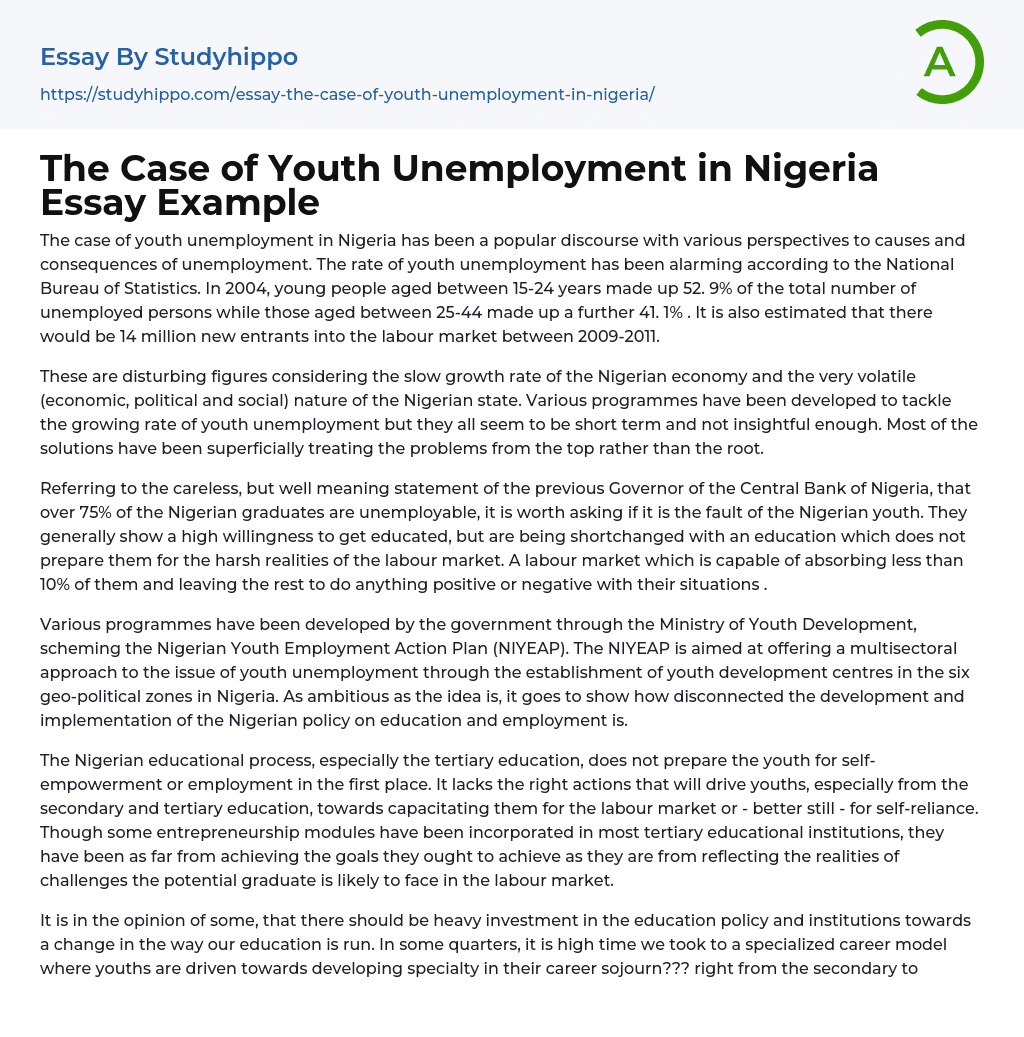The case of youth unemployment in Nigeria has been a popular discourse with various perspectives to causes and consequences of unemployment. The rate of youth unemployment has been alarming according to the National Bureau of Statistics. In 2004, young people aged between 15-24 years made up 52. 9% of the total number of unemployed persons while those aged between 25-44 made up a further 41. 1% . It is also estimated that there would be 14 million new entrants into the labour market between 2009-2011.
These are disturbing figures considering the slow growth rate of the Nigerian economy and the very volatile (economic, political and social) nature of the Nigerian state. Various programmes have been developed to tackle the growing rate of youth unemployment but they all seem to be short term and not insightful
...enough. Most of the solutions have been superficially treating the problems from the top rather than the root.
Referring to the careless, but well meaning statement of the previous Governor of the Central Bank of Nigeria, that over 75% of the Nigerian graduates are unemployable, it is worth asking if it is the fault of the Nigerian youth. They generally show a high willingness to get educated, but are being shortchanged with an education which does not prepare them for the harsh realities of the labour market. A labour market which is capable of absorbing less than 10% of them and leaving the rest to do anything positive or negative with their situations .
Various programmes have been developed by the government through the Ministry of Youth Development, scheming the Nigerian Youth Employment Action Plan
(NIYEAP). The NIYEAP is aimed at offering a multisectoral approach to the issue of youth unemployment through the establishment of youth development centres in the six geo-political zones in Nigeria. As ambitious as the idea is, it goes to show how disconnected the development and implementation of the Nigerian policy on education and employment is.
The Nigerian educational process, especially the tertiary education, does not prepare the youth for self-empowerment or employment in the first place. It lacks the right actions that will drive youths, especially from the secondary and tertiary education, towards capacitating them for the labour market or - better still - for self-reliance. Though some entrepreneurship modules have been incorporated in most tertiary educational institutions, they have been as far from achieving the goals they ought to achieve as they are from reflecting the realities of challenges the potential graduate is likely to face in the labour market.
It is in the opinion of some, that there should be heavy investment in the education policy and institutions towards a change in the way our education is run. In some quarters, it is high time we took to a specialized career model where youths are driven towards developing specialty in their career sojourn??? right from the secondary to tertiary education as this will build them into proficiency and self belief and into people who are not worried about getting unemployed, but possess the technical competence to utilize their skills in solving the socio-economic problems.
In order to solve the problem of youth unemployment through education, our education process must focus on merit in every aspect of it. This includes teachers that
have to be well trained and prepared to shape the lives of the youth towards self-reliance by maintaining strict admission requirements for intending educationists. Nigerians need to see education as a career and not as an option where those that cannot make grades to study courses of their choice are ‘dumped’ to study education by compromise. Especially when they do not know what it takes to study education and the inherent responsibilities they are about to shoulder.
The institutional hiccups must be overcome in order to avoid the double waste, where so much is spent on educating a youth whose services are not needed. And this youth in return burdens the economy and negatively adds up the rising number of the young dependent population. We must satisfy their willingness to receive quality education that prepares them to solve their problems and ultimately reduce the economic problems of youth unemployment. Salaudeen Abdulrahman Adeshina is an alumnus of the GAGG 3rd Generation who resides in Lagos, Nigeria.
- Academia essays
- Higher Education essays
- Language Learning essays
- Studying Business essays
- Education System essays
- Study essays
- First Day of School essays
- Scholarship essays
- Pedagogy essays
- Curriculum essays
- Coursework essays
- Studying Abroad essays
- Philosophy of Education essays
- Purpose of Education essays
- Brainstorming essays
- Educational Goals essays
- Importance Of College Education essays
- Brown V Board of Education essays
- The Importance Of Higher Education essays
- Online Education Vs Traditional Education essays
- Academic And Career Goals essays
- Academic Integrity essays
- Brown Vs Board Of Education essays
- Distance learning essays
- Technology in Education essays
- Vocabulary essays
- Writing Experience essays
- Importance of Education essays
- Early Childhood Education essays
- Academic Degree essays
- Academic Dishonesty essays
- School Uniform essays
- Academic writing essays
- Cheating essays
- Bachelor's Degree essays
- MBA essays
- College Life essays
- Grade essays
- Diploma essays
- Phonology essays
- Sentence essays
- Filipino Language essays
- Pragmatics essays
- Millennium Development Goals essays
- History Of Education essays
- Graduate School essays
- Middle School essays
- School essays
- Special Education essays
- University essays




